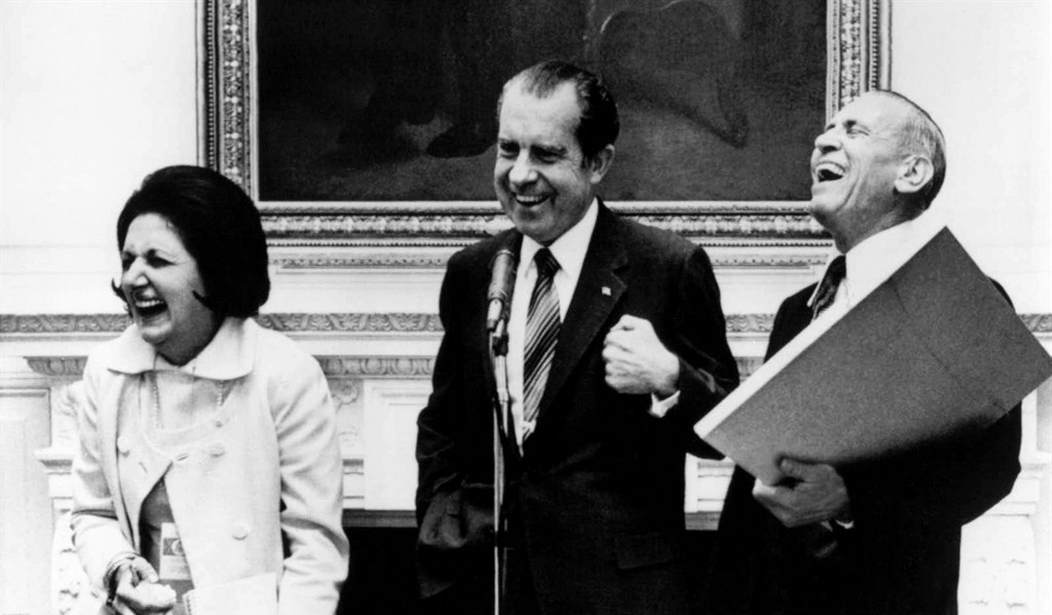Does Nixon's rise, from crushing defeats in 1960 and 1962, and the debacle his party suffered in 1964, to capturing the White House and beginning a string of five victories in six presidential elections, have relevance for today's GOP?
Can the "Great Silent Majority" of yesteryear be replicated?
The answer is probably not. For while there are similarities between the America of 1968, and of today, the differences are greater.
The similarities: By the late 1960s, as today, the country was pivoting away from a Democratic Party and president that seemed incapable of mastering the crises of the times in which they lived.
Then it was LBJ; today, Barack Obama.
In 1968, America turned to the GOP to manage a bloodier war than Iraq, that the Democratic Party could not win or end, and to cope with the social anarchy Lyndon Johnson's Great Society seemed to have ushered in.
And the party of Richard Nixon and Ronald Reagan delivered -- eventually -- a successful conclusion to the Cold War that had been the unifying cause of that generation.
America is another country today.
The Cold war is over. The nation is no longer united on America's role. A majority want out of the Middle East wars into which George W. Bush led the nation.
And the GOP is itself, like the Democrats of 1968 over Vietnam, divided on Afghanistan, Iraq, Syria, Ukraine, and how to deal with the challenges of Vladimir Putin's Russia and Xi Jinping's China.
While distrust of government has rarely been greater than today, it is also true that dependence upon government has never been greater.
Recommended
Tens of millions of families rely on the government as a primary source of income, food, health care, housing and other necessities of daily life.
Government's role in education has never been greater.
A Republican Party that preaches an anti-Big Government gospel or a rollback of programs is unlikely to be warmly received by the scores of millions who depend on Social Security, Medicare, Medicaid and a host of other social welfare benefits.
Republican proposals to cut taxes on income, capital gains, estates and inheritances are unlikely to win standing ovations from folks who pay no income taxes and have no estates or capital gains.
America is another country in other ways.
Nixon's Silent Majority, which encompassed much of the Greatest Generation and of the Silent Generation born in the 1930s and during World War II, is passing on. And with a birth rate among the following generations below replacement levels for 40 years, the demography of America is markedly different from the days of Ike and JFK.
Newborns who trace their ancestry to Asia, Africa and Latin America equal those babies born to white Americans today. And these minorities vote between 70 and 90 percent for Democrats in presidential races.
Where the natural Democratic constituencies are growing as a share of the population, the natural Republican constituents -- older, whiter, more religious -- are declining in real and relative terms.
Moreover, the cultural revolution of the 1960s, against which Nixon and his vice president, Spiro Agnew, inveighed so successfully, is now dominant in the arts, the academy and the media.
George McGovern could not overcome the perception that he was the candidate of "acid, amnesty and abortion."
Since McGovern in 1972, abortion has become a constitutional right and is championed by half of America as "freedom of choice." And while "acid," or LSD, is little heard of, legalizing marijuana is a popular cause, and not only among the young.
As for amnesty, that was granted to the Vietnam-era draft-evaders by Gerald Ford. Three million illegal aliens were given amnesty by Ronald Reagan. Now, Big Business, Big Labor, the churches, the Hispanic community, the Democratic Party and a slice of the GOP are all calling for amnesty for the 12-20 million illegal aliens in the country.
Wherein lies the Republican opportunity? It resides in a political reality that was present in 1968 as well.
Even if the country was not wildly enthusiastic about Richard Nixon that year, America knew the Johnson administration was failing, that it was devoid of ideas, that in that year of turmoil, 1968 -- a year of assassinations, war, riots, and social revolution, and a Democratic Party that could not hold itself together, let alone the country -- we needed new leadership. We needed new ideas.
America is approaching a similar point now. And therein lies the Republican Party's last best chance to be entrusted with national power.
The GOP needs to offer a credible alternative to a party, a president, and a political philosophy, that seem everywhere to be failing the nation.
Nixon did it in 1968, to the amazement of even some of his friends.
Can the GOP replicate 1966 and 1968, in 2014 and 2016?
The answer to that question will determine our future.

























Join the conversation as a VIP Member